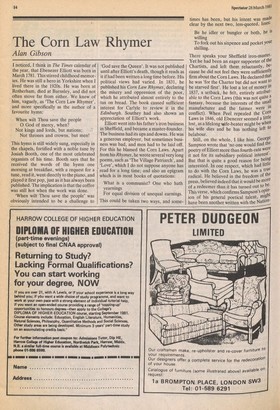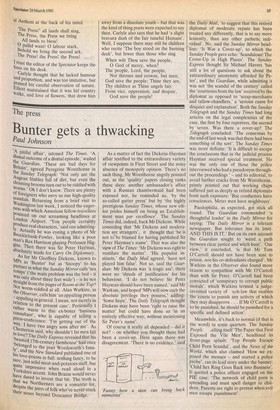The Corn Law Rhymer
Alan Gibson
I noticed, I think in The Times calendar of the year, that Ebenezer Elliott was born in March 1781. This stirred childhood memories. He was still a hero in Yorkshire when I lived there in the 1920s. He was born at Rotherham, died at Barnsley, and did not often move far from either. We knew of him, vaguely, as 'The Corn Law Rhymer', and more specifically as the author of a favourite hymn: When wilt Thou save the people 0 God of mercy, when?
Not kings and lords, but nations; Not thrones and crowns, but men!
This hymn is still widely sung, especially in the chapels, fortified with a noble tune by Josiah Booth, one of the most celebrated organists of his time. Booth says that he received the words of the hymn one morning at breakfast, with a request for a tune, read it, went directly to the piano, and played it first pop, just as it has always been published. The implication is that the coffee was still hot when the work was done.
'When wilt Thou save the people' was obviously intended to be a challenge to 'God save the Queen'. It was not published until after Elliott's death, though it reads as it if had been written a long time before. His political views had varied. In 1831, he published his Corn Law Rhymes, declaring the misery and oppression of the poor, which he attributed almost entirely to the tax on bread. The book caused sufficient interest for Carlyle to review it in the Edinburgh. Southey had also shown an appreciation of Elliott's work.
Elliott went into his father's iron business in Sheffield, and became a master-founder. The business had its ups and downs. He was a generous employer, but sometimes business was bad, and men had to be laid off. For this he blamed the Corn Laws. Apart from his Rhymes, he wrote several very long poems, such as 'The Village Patriarch', and 'Love', which I do not suppose anyone has read for a long time; and also an epigram which is in most books of quotations: What is a communist? One who hath yearnings For equal division of unequal earnings.
This could be taken two ways, and some times has been, but his intent was made clear by the next two, less-quoted, lines: Be he idler or bungler or both, he is willing To fork out his sixpence and pocket your shilling.
There speaks your Sheffield iron-master. Yet he had been an eager supporter of the Chartists, and left them reluctantly, hecause he did not feel they were sufficiently firm about the Corn Laws. He declared that he was 'for the Charter but did not want t° be starved first'. He lost a lot of money at 1837, a setback, he felt, entirely attributable to the Corn Laws (this was not quite a fantasy, because the interests of the small manufacturer and the farmer were in conflict). When Peel repealed the Corn Laws in 1846, old Ebenezer seemed a little lost, as a lifelong wife-beater might be when his wife dies and he has nothing left to belabour. Still, on the whole, I like him. George Sampson wrote that 'no one would find the. poetry of Elliott more than fourth-rate were it not for its subsidiary political interest . But that is quite a good reason for being interested. In one respect, which had little to do with the Corn Laws, he was a true radical, He believed in the freedom of the press, believed indeed that it would be more of a redeemer than it has turned out to he. This verse, which confirms Sampson's °FT: ion of his general poetical talent, gar' have been another written with the Nation al Anthem at the back of his mind: 'The Press!' all lands shall sing, The Press, the Press we bring All lands to bless! 0 pallid want! 0 labour stark, Behold we bring the second ark, The Press! the Press! the Press!
I trust the editor of the Spectator keeps the lines on his desk. Carlyle thought that he lacked humour and Proportion, and was too imitative, but Praised his careful observation of nature. Elliott maintained that it was hi g country walks, and love of flowers, that drew him away from a dissolute youth — but that was the kind of thing poets were expected to say then. Carlyle also says that he had 'a slight bravura dash of the fair tuneful Hemans'. Well, I suppose there may still be children who recite 'The boy stood on the burning deck', but fewer than those who sing When wilt Thou save the people, 0 God of mercy, when?
The people, Lord, the people, Not thrones and crowns, but men; God save the people; Thine they are, Thy children as Thine angels fair: From vice, oppression, and despair, God save the people!











































 Previous page
Previous page